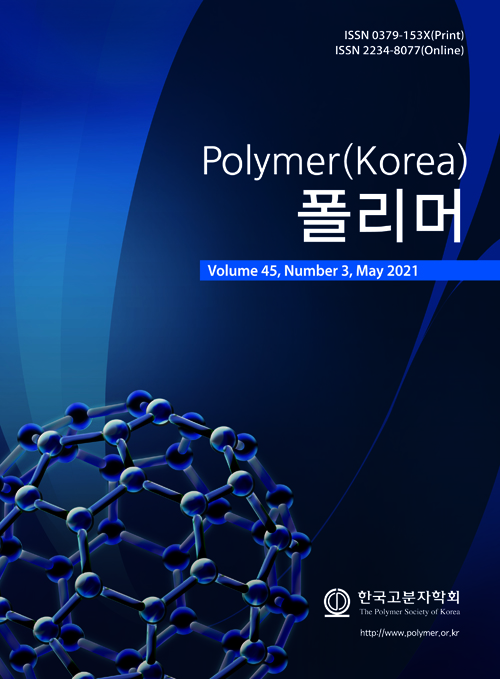- Synthesis of Biomass-based Reactive Plasticizer and Its Effects on the Processing Properties of Poly(vinyl chloride)
Department of Polymer Science and Engineering, Chungnam National University, 99, Daehak-ro, Yuseong-gu, Daejeon 34134, Korea
- 바이오매스 기반의 반응형 가소제 합성 및 Poly(vinyl chloride)의 가공 특성에 대한 영향
충남대학교 고분자공학과
Reproduction, stored in a retrieval system, or transmitted in any form of any part of this publication is permitted only by written permission from the Polymer Society of Korea.
Waste vegetable cooking oil (WVCO), a type of biomass, is primarily produced in large quantities within the residential and commercial sectors and is a resource with low recycling rate. WVCO has been receiving much attention as a renewable resource due to rising environmental concerns and the depletion of petrochemical resources. In this study, reactive plasticizer (BmBP) recycled with biomass-based WVCO was synthesized via a three-step process that was innovatively simplified from the conventional seven-step epoxidation process, which has high heat resistance and high strength. The synthesized BmBP was compared with corresponding specialty plasticizers, such as TINTM and DIDP, in terms of processability.
바이오매스의 일종인 폐식물유는 대부분 주거 및 상업 부문에서 대량으로 생성되며, 재활용률이 낮은 자원이다. 폐식물유는 환경에 대한 관심이 고조되고 석유화학 자원의 고갈에 따라 재생가능한 자원으로서 지대한 관심을 받아오고 있다. 본 연구에서는 바이오매스 기반의폐식물유를 재활용하여 고내열성 및 고강도 특성이 우수한 반응형 가소제(BmBP)를 기존의 7단계 에폭시화 반응 공정을 혁신적으로 단순화한 3단계 공정을 통해 합성하였다. 합성된 가소제는 대응하는 특수 가소제인 TINTM 및 DIDP와 가공성 측면에서 상대 비교를 하였다.
Keywords: biomass, reactive plasticizer, poly(vinyl chloride), thermal property, mechanical properties
- Polymer(Korea) 폴리머
- Frequency : Bimonthly(odd)
ISSN 0379-153X(Print)
ISSN 2234-8077(Online)
Abbr. Polym. Korea - 2023 Impact Factor : 0.4
- Indexed in SCIE
 This Article
This Article
-
2021; 45(3): 380-389
Published online May 25, 2021
- 10.7317/pk.2021.45.3.380
- Received on Nov 17, 2020
- Revised on Dec 29, 2020
- Accepted on Jan 4, 2021
 Correspondence to
Correspondence to
- Jae-Koo Kim
-
Department of Polymer Science and Engineering, Chungnam National University, 99, Daehak-ro, Yuseong-gu, Daejeon 34134, Korea
- E-mail: jack70@megen.co.kr









 Copyright(c) The Polymer Society of Korea. All right reserved.
Copyright(c) The Polymer Society of Korea. All right reserved.